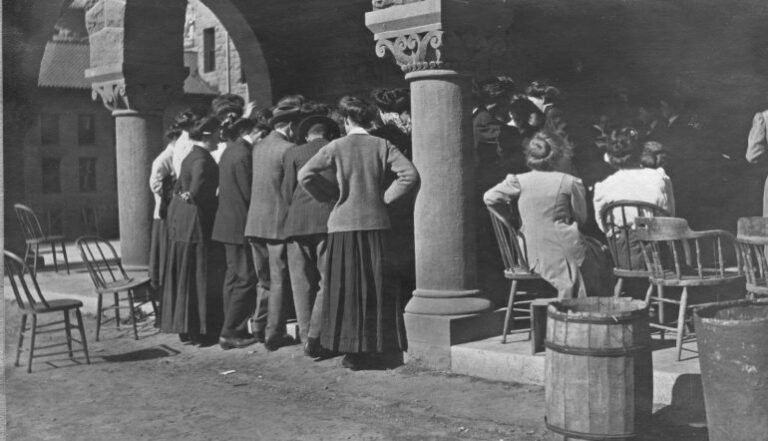Review: SOMETHING WILL HAPPEN, YOU’LL SEE by Christos Ikonomou

Something Will Happen, You’ll See
Christos Ikonomou, translated by Karen Emmerich
Archipelago Books, March 2016
250 pp; $18
Buy: paperback
Reviewed by Ingrid C. Wenzler
Christos Ikonomou’s Something Will Happen, You’ll See is a collection of stories focused on the men and women of Piraeus, a port city in Greece. Though Ikonomou’s characters are faced with Greece’s economic crisis, and the collection is beholden to particular circumstance, place, and time, Something Will Happen is not so particular as to be prohibitive. It’s spare. It’s intricate, full of heart and heft, and about the crisis only insofar as it enters the lives of these men and women, their dreams and thoughts, their relationships and homes.
Something Will Happen begins in Ellie Drakou’s kitchen. The water is running. Ellie is at her sink, washing lettuce. Ikonomou lingers over this scene, the first in the collection’s first story. Maybe because Ellie herself is in the mood to linger. We learn that Friday night is her favorite night. We learn more about her reasons for liking lettuce. Because “it has such a tender white heart.” Because washing lettuce is like “slowly and carefully and excitedly unwrapping a gift that someone else wrapped in layers of green paper.” Because “her own heart sweetens at the sight of those small tender leaves.” This scene could be thought of as an organizing scene. It’s one that teaches us about the collection as a whole, that prepares us for moments of tenderness even amid desperation, and provides us with a clear example of the simple objects and rituals—washing lettuce on a Friday—that these characters will cling to even as their lives fall apart. This scene also reveals something about this collection’s greatest source of power, its tiniest leaves. Whether or not Ikonomou means to position his collection, as a whole, as a kind of a head of lettuce—I doubt his thinking is quite that pat—such a comparison is one way of thinking about these stories and what holds them together.
Because the collection is centered around working-class men and women, who are worried over bills, over losing jobs, finding jobs, and keeping their homes, there is the risk of hitting the same note too many times. Ikonomou doesn’t do this. Instead, he reminds us that amid desperation there is beauty. There is tenderness. Stubbornness. Confusion. There are infinite notes to hit, infinite attitudes and feelings about similar sets of circumstances, or experiences. In the second story, “The Tin Soldier,” the narrator’s brother, who the narrator has just picked up from the hospital again, asks the narrator to pull over. It’s raining. The bandage on his head is loose, but he gets out of the car, points at the tin soldier he’s spray-painted on the wall in front of him, and insistently remembers their father and the tale of the tin soldier, a tale they were raised on. The narrator is annoyed with him. “Okay, Picasso,” he yells from the car, but his brother, a “fucking idiot,” who is always joining protests and getting “pummeled” as a result, doesn’t stir. He stands in the rain, wondering aloud if parents will someday “tell their children stories about strange people who lived and died for a handful of cash.” This story is typical Ikonomou. We get a few important, expected details—about violence, protests and party lines—as well as a painted tin soldier, an injured dreamer and a narrator unwilling to involve himself. It’s a complicated picture, as it should be.
I’m sure it comes as no surprise that the structure of this collection is just as complicated, just as nuanced. Unlike many collections unified by place and time, this one seems to find its unity less in major features, more in minor hitches, like repeated images, phrases and details. One story ends with a storm. The next begins with one. Ellie’s husband has left her for “a handful of cash” like the strange people mentioned in “A Tin Soldier.” All to say, the construction of this collection is careful. It’s thoughtful but never tedious. In the collection’s title story, Niki reflects on something she saw on TV, a Native American girl, who reflecting on her tribe’s history, had said: “The truth of a story lies not in a story’s adherence to facts but in its moral character.” If you’re like me, you come to that and think, huh, interesting. Doesn’t that sound like something out of Tim O’Brien? The delight that comes, when you see the next story’s title, “The Things They Carried,” is as pure as it is minute. For a moment, you feel like Ikonomou’s read your mind, or the other way around.
His ability to evoke a particular moment, to enter the lives of men and women, make those lives comprehensible to anyone anywhere, who’s ever worried over bills, and somehow work on a more cosmic scale, is remarkable. It’s rare and shiny and sort of like magic. I won’t tell you how he arrives at the collection’s final image—Niki, the woman, who remembers the Native American girl in the title story, reaching “a hand toward the stars like a beggar”—but I will say, I think it’s just right, so icy perfect, you half-expect it to shatter.
Ingrid C. Wenzler studied Creative Writing as an undergraduate at Connecticut College. Just this December, she completed an M.F.A. in fiction at University of Arizona. She’s at work on a collection of short stories unified by theme and has work published in Cleaver Magazine and Fjords Review.


